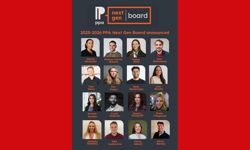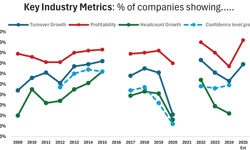While selling ads for other publishers, CEO Tim Slee realised that the big-earning people working in the City of London were being completely overlooked as a niche consumer audience. Square Mile was born as a lifestyle title for that big-hitting audience, and found itself in the right place at just the right time – no competition and a buoyant market – admittedly, Slee says, more by luck than judgment. “Everybody had money to be investing in advertising at the time and it absolutely flew,” he said. Then recession came.
“Those three years are really what enabled us to be established because we just made such a name for ourselves, it set us up to get through the next three or four years of recession,” Slee says. “Turnover still grew every year (after that), but it just didn’t feel like that. Clients wanted twice as much for half the money, and lots of companies which were deemed similar to ours went bust, but I guess we were helped by the fact we were all very young, we didn’t have huge personal demands on the business, nobody was taking massive salaries and we could put it all back into the business and something we loved. To the outside world, it looked like nothing changed but god, I had a lot more hair before the recession.”
Early expansion
The publisher expanded with two new titles, only one of which has survived. Benchmark was partly a victim of recession and partly folded because it was too similar to Square Mile, but aimed at a legal rather than financial audience. “We’d found a niche with Square Mile; advertisers wanted to reach a very wealthy audience which was bankers, brokers and traders and it was a well-known audience as well. Everybody knows what a stock broker is,” says Slee. “Then we realised there was a demographic above that, which was a hedge fund manager. Hedge was a natural product for us to do and remains the jewel in our crown in terms of publishing, it’s a beautiful product. We found that once we launched Benchmark and we were going to the legal guys, though it was another great demographic, it was probably something that could be incorporated within perhaps Square Mile, so we were going for the same advertisers and telling them the same story three times over. We made a decision to make sure we had one very mainstream high-end product in Square Mile, and one which was the next level above, Hedge.”
The next launch didn’t come until 2013, and this time there was no risk of an overlap with Square Mile; Escapism is a mass-market travel title. Soon after, Foodism, which is web-based, was launched, with a print presence inside Escapism. The most recent Square Up launch was this summer, with Festival Baby, an online guide to international music festivals. The early launches were ‘head’ decisions; the latter ones have been driven by the heart, Slee says.
Passion
“The strategy for me going forward is to launch products that you genuinely have a massive passion for and love doing yourself,” he says. “I love Square Mile, I think it’s a classic product and remains our biggest and strongest brand, and Hedge is our most beautiful printed product, but I’m not a hedge fund manager or a stock broker, but I am someone who loves to travel. Then we’ve got food and then we’ve got festivals, so you can kind of see the strategy – it’s things that we like doing.”
The oldest person in the Square Up office is 39, and the staff’s youth and passions are reflected in the publisher’s products, Slee says. New products have to make commercial sense, but staff enthusiasm is just as important, “because more often than not, everybody here works very, very hard and puts in a lot of hours, and it’s a lot easier to do if it’s on products and things you really enjoy.” Escapism has an ABC of just under 82,000; 32,000 have signed up for Foodism’s e-newsletters, and Festival Baby is aiming to have 60,000 monthly unique users within three months of launch and to be the largest festival site in the world by the end of the year.
The business model
The Square Up business model is essentially based on advertising and sponsorship; sponsored events are a huge part of what the publisher has to offer commercial partners, given the nature of its consumers. “If you’re saying you’ve got a certain type of audience, after a while, (advertisers) want to get face time with them and see these people,” Slee says. Square Up runs up to 40 events a year, from small soirees above Bond Street boutiques to huge charity balls, linking hard-to-reach consumers with brands that are prepared to offer something special. “We did a summer party once for 4,000 people in the middle of the square mile; it was nuts and we had a queue around the block. It was a free invite to our readers, and never again will we ever do that!”
Print remains at the heart of the business, but expansion decisions – and opportunities for partners – span multiple platforms. “Initially we had one printed product, now there are five brands and they come over a collection of magazines and newsletters and websites and iPad apps and events and it was a case of, being a young and dynamic company, we were able to evolve with whatever it was the client was after, and hopefully we were doing that before they were asking if we had it,” Slee says. Sales aren’t divided by medium. “We don’t sell one or the other, we sell the brand.” The clients want to reach the target audience in an effective way, and large-scale partnerships usually involve several platforms and an event. “For the people who work here, all of this feels completely natural; it’s the way that we consume media,” Slee says. “If I’m going to read a long-form article, I’d much rather read it in a nice print product, but if I just want to get some quick snappy information, I’m more likely to do that through an email newsletter or using my iPhone.”
Overseas opportunities
Square Up had early plans to expand internationally, with plans for a US edition of Square Mile getting close to publication right before the recession hit. “We suddenly started to get the vibe that things weren’t quite right in the market,” Slee says. The plug was pulled. “I’d have loved to have done it – imagine running a business in London and New York in your mid-20s – it would’ve been fantastic – but sometimes those dreams have got to wait. I don’t know if we’d have a UK business now if we’d decided to try and battle on two fronts, so it turned out to be a good decision.”
The company is pursuing a lower-risk expansion strategy now, and is in talks with licence partners in several regions for local editions of Square Up titles. While the US was top of the priority list last time around, it’s in the Far East and Middle East where talks are now most advanced. It helps that most of the company’s advertising partners are global brands, and the marketing contacts made in Europe can introduce their counterparts in other regions.
The automation of advertising sales is not a phenomenon that’s likely to affect Square Up. Slee says the personal relationships between staff and clients and agencies is one of its biggest strengths. “I can’t believe our industry will ever be fully automated with media sales. You need people to be able to introduce the products and the brands to somebody who perhaps didn’t know about them before, and that’s something we do fantastically well. For our business, relationships with our clients will always be what we build the business on.”
But the greater integration of platforms for consumers is where the industry’s biggest challenge lies, Slee says, and he warns that those failing to make their brands truly cross-platform will fail. “There’s still a huge chunk of our industry that’s slow to catch up. I’m a big believer in it being much better if everybody’s doing well than there being a few guys as stand-outs. The recession was great for forcing our industry to evolve and clearing out a lot of bad media, and there’s still a good chunk that will probably be affected by it, but those that come out the other side are part of a much stronger industry for us all to go out and offer better products to our clients.”
Rounders anyone?
While the next few months will be about consolidating the existing products in the portfolio, Slee says he does have one eye on the next project, and there are loose plans forming for a launch at the end of the year. “The plan is to keep finding things we enjoy and keep launching media products around them. We’ve got a very fit, healthy and sporty office and I’d like to think there’s something in that arena.”
The office culture is essential to Square Up’s success, Slee says. Music is playing as he speaks to InPublishing, and there are discussions about abandoning the office in the afternoon for a game of rounders on Clapham Common. “The sun’s out and one of the reasons everybody works here is it’s a fun environment,” he says. “On the same score, everybody knows when they’ve got to work hard as well. When we were launching our iPad product 18 months ago, without ever asking, the design team worked every weekend for a month, and that’s not something that came from me, they just did that. Then they’ll take their time off when they can get it.”
And what happens when the staff start to hit their 40s? Slee says he’s not too worried about losing the young vibe of the office. “I feel about 12, I seem to be regressing.”
Company launched in 2005 in London
CEO: Tim Slee
Its first title, Square Mile, has a circulation of just over 57,000
Other titles: Hedge, Escapism, Foodism.co.uk
Latest launch: Music festival site FestivalBaby.com
Number of full-time staff: 35
Turnover in 2013: £2.2 million












